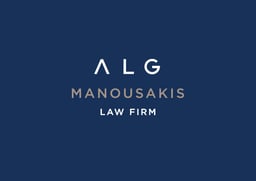
Ioannis Manousakis, Managing Partner
Managing Partner Ioannis Manousakis explains how the firm is responding to clients’ changing needs.
What do you see as the main points that differentiate ALG from your competitors?
Our Law Firm aims to make our clients feel, that each one of our partners or associates, is their own in-house counsel. We have been successful in our goal through deep understanding of all aspects of the business world, innovative, tailor-made, and innovative solutions for each of our clients and thorough knowledge of the industry sectors we serve.
We take pride in our practice of contracting and data privacy support of our clients. We have implemented flexible models to support day-to-day operations of clinical stage biotech or commercial pharma companies. We believe the burden of important tasks for business owners which consume significant amount of time for in-house counsels.
Which practices do you see growing in the next 12 months? What are the drivers behind that?
We envisage that growth will come where our firm is already established, namely in contracting and compliance (with emphasis in data privacy) support of pharma companies. The model of outsourcing functions of the in-house legal department is growing and the characteristics of our services, i.e. fast and efficient response to business needs, ability to support ad-hoc projects and tailored support based on specific requests, fit perfectly to this trend.
Other areas which we see that growth will come from are the areas where we have a strong background and capacity and the expansion was slower due to our focus to our traditional strengths. These include corporate law, tax consulting and litigation, competition and antitrust and real estate.
What's the main change you've made in the firm that will benefit clients?
Main change and feature which benefits clients is that our services essentially substitute those of an in-house counsel and in the same time our clients do not pay a retainer for our services but are billed on actual services performed. This means that they can rely on us when they have few ad-hoc requests or rush projects without compromising quality and speed. This is achieved by always working with overcapacity which may seems strange for a law firm but in the end it pays out mainly for our clients but also for us since we are always able to accommodate large projects or rush requests.
Is technology changing the way you interact with your clients, and the services you can provide them?
Τhe services that we provide and the way we interact with our clients had led us to integrate legal technology into our operations already from the establishment of our law firm. Nevertheless, as technology evolves so do the needs of our clients and our necessity to adapt to both. To name few of the technologies that we adopted over the last years, we started with the implementation of cloud-based solutions to help lawyers and clients share files and data across disparate platforms rather than relying solely on emails. In addition, we used automation in our legal research and document review to simplify the drafting of high-frequency, low-complexity contracts and allow clients to sign them digitally. We also use technology to transform the routine but vital admin tasks and workflows that we must grapple with daily. For example, this includes organizing and tracking progress of client requests as well as reporting and communicating with our clients. Finally, we use tools and implement security and data protection policies that allow us to securely share encrypted data both within our organization and externally with clients, all while maintaining compliance.
Can you give us a practical example of how you have helped a client to add value to their business?
During the configuration of an online privacy platform to cover the global needs and internal structure of a multinational client by another law firm, although we had a supportive role at first, our team was later fully engaged actively to finalize the configuration due to project delays. Starting from reestablishing the project plan and workflows, we applied a hands-on approach coordinating the intensive interactions needed between the support departments of the platform’s provider and the internal stakeholders and implementing all the required actions to achieve a smooth and effective configuration of the platform to cover the data privacy requirements in multiple countries globally.
Are clients looking for stability and strategic direction from their law firms - where do you see the firm in three years’ time?
Corporate law firms are becoming more and more strategic advisors for the management of companies. That’s why we believe that all our lawyers need to have a solid knowledge of the business sector they are engaged in counselling. As an example for the pharma sector they need to know all the product stages including regulatory and promotional actions which are part of the business cycle. In this effect their advice will not only be focused on the legal aspects of each case but by taking into account the business needs will be forward-looking and solution oriented.
